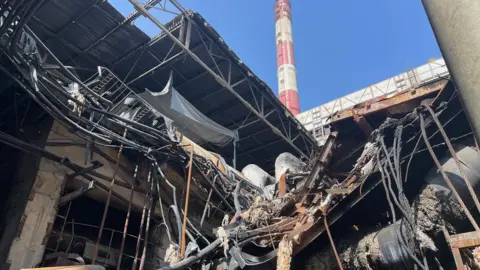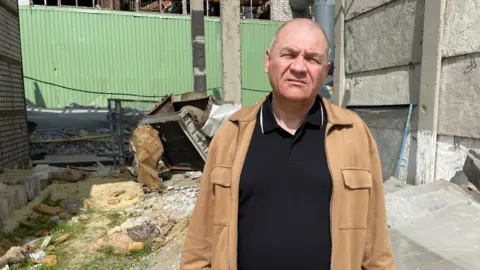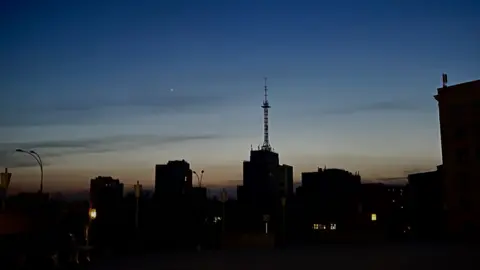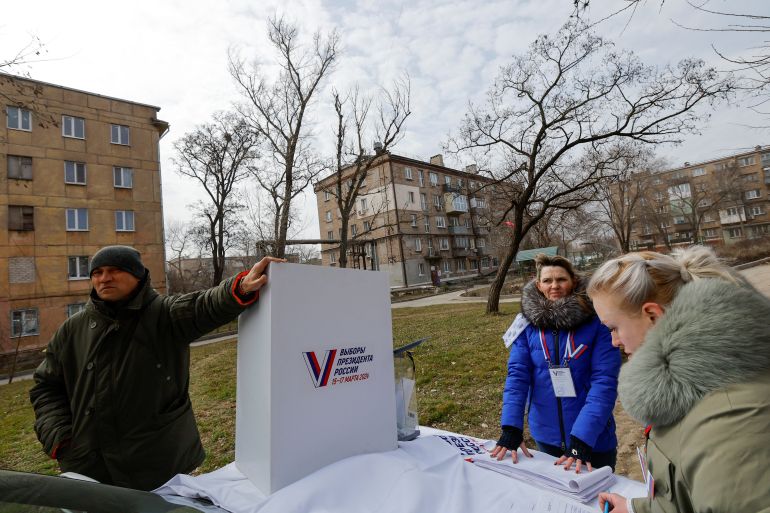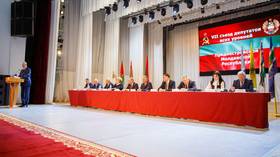2 hours ago
By Sarah Rainsford,Eastern Europe correspondent in Kharkiv
 ReutersBarely any of Ukraine’s power plants have escaped Russia’s drone and missile attacks
ReutersBarely any of Ukraine’s power plants have escaped Russia’s drone and missile attacks
Russia’s war on Ukraine has entered a new phase. Drone and missile attacks on Ukraine’s energy infrastructure are now frequent and massive, overwhelming its current air defences.
They often include the same Iranian-made Shahed drones just launched by Tehran at Israel. President Volodymyr Zelensky said their sound, whether in the skies over the Middle East or in Europe “must serve as a wake-up call to the free world”.
Officials in Ukraine say they can “count on one hand” the thermal and hydro power plants across the country that are not yet badly damaged or totally destroyed.
Last week, a major facility close to Kyiv was hit. To the northeast, in Ukraine’s second city Kharkiv, all three major power plants are in ruins. DTEK, a private energy company, has revealed it’s operating at less than 20% capacity after repeated missile strikes.
As Ukraine scrambles to repair what it can, and keep the electricity flowing to homes and industry, it is issuing increasingly urgent calls for outside help. The Russian assault has not stopped.
The red-and-white striped chimneys of Kharkiv’s Thermal Power Plant No.5 are still visible from miles away. Approach a little closer, and the destruction beneath is revealed. The main building has a huge hole blown through the heart of it. All around is a mess of blackened metal and smashed concrete.
Kharkiv’s Thermal Power Plant No.5 has seen devastating damage from Russian strikes
The attack on 22 March was deliberate and devastating. Five Russian missiles struck the same spot, mangling turbines, generators and transformers and taking the plant offline. A week later, Russia targeted the city’s power plants again.
For Ihor Orlovskiy this feels personal.
“It’s like looking at the ruins of your own home. It brings pain and tears,” the deputy director says, leading me across chunks of metal and stone to the spot where the missiles exploded.
He’s worked here since Soviet times.
“It’s a very bitter feeling. But this mobilises us too, to build back. Because we know a city of more than a million people is depending on us.”
There have been six attacks on this plant since the start of the full-scale invasion, but the one in March was the worst by far.
It was also the most demoralising: it took engineers a full year to repair one section of the plant, then two weeks after it was restarted Russia hit exactly the same spot.
Other industry sources tell similar stories of increasingly accurate strikes. In the past, they say, missiles would fall short or cause less damage.
That leads some to suspect Russian agents inside Ukraine are feeding information to Moscow: the power plants cover vast territory and the damage, or repairs, are impossible to conceal.
But Russia already knows where to target.
The heavy machinery dates back to the USSR, there are still Soviet labels on the ruins, and Moscow has the old blueprints of the plants.
Ihor Orlovskiy suspects the increased precision is more likely down to the sheer intensity of recent attacks. “When you launch five, six, seven missiles at the same spot, some are bound to hit.”
Ihor Orlovskiy believes the increased precision of the attacks is down to their sheer intensity
In the fields all around there are giant electricity pylons. But since March there’s been nothing flowing along the lines from Power Plant No.5, or Kharkiv’s other thermal power plants.
The city has to bring in power from western Ukraine, which means limited supply and regular blackouts. The Russians have targeted electricity substations too.
Local authorities are scrambling to minimise the impact and reduce the time homes and businesses are left in the dark. Residents have learned to charge their devices, and multiple power banks, as soon as the electricity comes on. They also keep reserves of water for drinking and washing.
The Kharkiv metro is back working, albeit in fits and starts, and so are the traffic lights. But with an unreliable power supply that could get worse, businesses are creating their own solutions.
Kharkiv is a major publishing hub and Oleksandr Popovich, the boss of a large printing firm, says for weeks they have been relying on three generators.
Kharkiv’s power supply is currently limited so there are regular blackouts
Early in the war a missile hit 100m (330ft) from the main production line.
“It destroyed all our storage and 10 tonnes of paper. But a tough day only makes us tougher,” says Mr Popovich, radiating the spirit of defiance and determination that has become Kharkiv’s trademark.
“Unfortunately, I can’t fix the electricity,” he says.
“But everyone has to do their own job. Mine is to produce books until our victory. We must keep working. We must give people in Ukraine the chance to read new books.”
The firm did consider relocating further away from the Russian border, but they decided to stay and have even invested in increasing production.
Now that Russia is targeting Kharkiv with renewed focus he admits to worrying: “Then I think about our army. Our soldiers need to know they are not defending empty cities. They are defending cities with people.”
Oleksandr Popovich says his large printing firm must keep working to provide Ukrainians with books
Dozens of his own staff have signed up to fight. The photograph of one, killed in action on the eastern front line, hangs beside the main entrance.
Reports from the front are now sobering.
Ukraine’s commander-in-chief, Gen Oleksander Syrskyi, said at the weekend the situation along sections of the front line had “significantly worsened”.
Warmer weather and firmer ground were helping Russia launch assaults in armoured vehicles and put Ukrainian forces under renewed pressure, he wrote on Telegram.
Fighting around Chasiv Yar in the Donbas is especially intense. The general believes Russia wants to take the territory by 9 May, a symbolic date when Moscow celebrates the Soviet victory over Nazi Germany.
Gen Syrskyi described the “heroic” efforts of his troops in “holding back the enemy’s daily attacks”. But he also mentioned the need to improve their “moral and psychological” state.
After more than two years, they are exhausted. But when MPs in Kyiv finally voted on a new law regulating how men are mobilised, the amendment setting a limit for how long they have to fight had been removed.
Against the larger army of its enemy, Ukraine needs all the soldiers it can muster.
The slip in morale is compounded by a shortage of ammunition now reaching the front lines and the continuing failure of the US Congress to approve a critical package of aid for Kyiv.
Ukraine’s troops, like everyone here, sense their war sliding down the international agenda.
And now there’s new cause for dismay, as many note the difference in response to the escalating crisis in the Middle East.
Israel has had direct support to protect its skies from Iranian missiles and drones, even as the same countries limit their help to Ukraine which is under Russian attack every day.
President Zelensky hinted at the frustration in his condemnation of Iran’s actions.
“The world cannot wait for discussions to go on,” Ukraine’s president wrote on Twitter, or X. “Words do not stop drones and do not intercept missiles. Only tangible assistance does. The assistance we are anticipating.”
Germany has just promised to send an additional Patriot air defence unit to Ukraine “immediately”. Thanking Chancellor Olaf Scholz for the support at a “critical moment”, Volodymyr Zelensky urged other countries to follow suit.
The staff of Kharkiv’s power plant No.5 would welcome the protection.
Repeat attacks
“We’d only just repaired things, and now we have to start all over again,” a worker called Yury told me. “We will sort it, but the main thing is not to get hit again!”
As he and others assess the damage, salvage what they can and draw up a plan for rebuilding, they face numerous air raid sirens every day.
Yury says the team had only just finished repairing the plant when it was hit again
There are two kinds of alert, a fire safety officer explains. If the threat seems focused around the border, about 40km (25 miles) away, some keep working.
“But if we see there’s a rocket risk for Kharkiv then there’s an announcement: ‘Urgent! To the shelter immediately!’,” he says.
That slows the recovery work and it shatters the nerves. Any missile fired at Kharkiv will hit within seconds, and the staff are surrounded by stark evidence of the danger.
But it’s not just the engineers and construction teams back at work.
When we arrived at the plant, a group of women were out cleaning the paths, painting the kerb, even pulling up dandelions around the main entrance.
A little later I found them down in the shelter during another air raid.
“Life goes on, and we still need to keep things nice,” said one woman, despite the entire power plant being in tatters.
“We like to keep things clean and in order. It’s our job. But it’s also good for the spirit!”
A group of women who work at the plant still spend time cleaning the area in order to keep morale up
The women had also painted the underground shelter in a fresh “salad” green, adding a splash of cheer to a Cold War-era bunker built to withstand nuclear attack by the West.
Instead it protects Ukrainians from ballistic missiles launched by their neighbour.
“They say it’s so we surrender, that they want to frighten us into running from here,” another woman chips in as the air raid ends and she prepares to head back up to work.
“They want us to leave Kharkiv. But we won’t do that.”
D/C: Russia taking full advantage of the Iran-Israel crisis. Great pity Ukraine does not have the same military support and equipment that Israel has! Without power can Ukraine even create new armaments? Looking very grim without immediate aid!
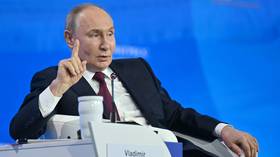
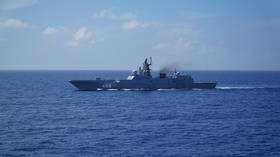



 ReutersBarely any of Ukraine’s power plants have escaped Russia’s drone and missile attacks
ReutersBarely any of Ukraine’s power plants have escaped Russia’s drone and missile attacks